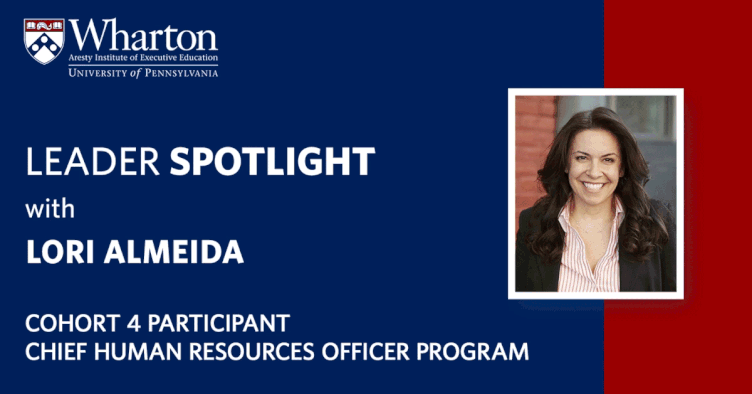How HR Leader Lori Almeida is Leveraging DEI Initiatives To Meet Business Outcomes

- Tell Us About Your Career Journey
- As Global Chief Talent Officer, You are Very Focused on DEI. How are You Addressing DEI in Your Company?
- What Were You Looking for in an Executive Education Program When you Decided to Enroll?
- What Has it Been Like to be a Part of a Global Cohort?
- What’s the Learning Experience Been Like?
This article originally appeared on Wharton Executive Education’s LinkedIn page. Program alum in focus: Lori Almeida
Over the past two decades, Lori Almeida has developed a deep knowledge of what it takes to be effective as an HR leader in industries ranging from retail to advertising. As global chief talent officer at Siegel+Gale, she is an innovator in developing diversity, equity, and inclusion initiatives aligned with business outcomes.
Almeida enrolled in Wharton Executive Education’s Chief Human Resources Officer (CHRO) Program to deepen her understanding of cutting-edge HR strategy and acquire the skills and frameworks to advance her career, impact her company, and grow her network. She says she finds the program stimulating and engaging. “The sessions are great. I enjoy learning from the case studies — doing deep analysis and looking at a business challenge from different perspectives. I’m taking ridiculous amounts of notes,” Almeida says. “It’s exactly what I was looking for.”
We sat down with Almeida to explore her career and how the program is helping her as an HR leader.
Tell Us About Your Career Journey
I went to undergrad at Roger Williams University in Rhode Island and then moved to New York to go to law school at the City University of New York School of Law. My first job after law school was at a nonprofit. There wasn’t enough of a budget to actually do the legal work as well as the HR work, so I ended up wearing two hats. I discovered I actually liked HR a lot more, so I moved toward that trajectory. I then moved on to a luxury retailer and it was there that I learned everything about HR, including a tremendous amount about unions and collective bargaining agreements as well as having different classifications of employees because we had everything from warehouse workers to executives. I then moved on to Merkley + Partners, an advertising agency that is a subsidiary of Omnicom Group, where I spent seven years.
I currently serve as global chief talent officer at Siegel+Gale, a strategic branding, design, and experience firm, which is also a division of Omnicom. It has been an amazing place to work. We hire such smart people that it forces you to raise your game every day and stay on your toes. We are a leader in the industry, and the work we produce is quite impressive.
As Global Chief Talent Officer, You are Very Focused on DEI. How are You Addressing DEI in Your Company?
We have significantly ramped up our work on DEI issues. After the murder of George Floyd, we put together a task force, brought in consultants, and held a series of listening sessions in order to put together a comprehensive DEI plan. I’m very proud of the progress we have made. We’re a better company for it, though we still have a ways to go.
DEI has become integral to what I do right now, and it can have a huge impact on the business. I’ve found it’s been very effective to make this shift from looking at diversity as making an impact on HR to making a much broader impact on the business. When I started approaching DEI with that perspective, I was able to move initiatives through the process so much faster. Aligning DEI to business needs and outcomes, winning new business, and being perceived as a leader in the industry and in the DEI space speaks for itself. Now, we are getting clients who are asking us to build them DEI programs given our success.
One project we’ve started, which is also a part of my capstone project with the CHRO Program, is forming a series of employee resource groups (ERGs), which have been fabulously successful. We have one group focused on women, one on BIPOC employees named the People’s ERG, and one on sustainability for our staff who are passionate about the environment. These groups are planning all types of events, holding listening sessions, and they have really taken on a life of their own. They offer a real sense of camaraderie in the office. They provide a safe space, and the feedback is that they are really valued.
We have also explored a number of initiatives to eliminate bias. Every employee is required to participate in training about implicit bias. We also piloted blind interviewing, where we removed the names of candidates and any other personal details from the resumes and other materials given to managers looking to fill positions. It helped shape the interview process to focus much more on the person’s experience rather than the individual.
What Were You Looking for in an Executive Education Program When you Decided to Enroll?
I wanted to grow in my career, and I didn’t quite know what the next step would be for me. I looked at a few other programs and the content offered, and I felt like this one gave me exactly what I was looking for.
The electives were really what drove me to want to do this, because I wanted to grow into a bigger role, but I didn’t know how to do that. The program has clearly shown me where I need to hone my skills.
The sessions are great. I like learning from the case studies — doing deep analysis and looking at a business challenge from different perspectives. We look at all of it through the lens of HR, which is what I value the most. It’s a streamlined version of exactly the things I need to know.
What Has it Been Like to be a Part of a Global Cohort?
I’m in awe of the makeup of the program. I’m surprised at how engaged everyone is, and they all have really big jobs. They are really accomplished leaders. I’ve always been the person that does all the work and reads everything, and I don’t even feel like I can hold a candle to these people. And it’s great to have that network, because I can ask them questions. They’ve been very supportive and candid. It’s just a nice group of people.
What’s the Learning Experience Been Like?
It brings me a refreshing perspective. Every day I go to work, this program is making me feel like I’m learning how to perform better at my job. It’s making me read different types of books than I would normally read. The community is wonderful, and I’m learning a lot from other executives. It’s been very supportive and nurturing across the diverse population that’s in this class — there are people from places like Hong Kong, the Middle East, apart from the United States. I’m challenged by the workload, but I feel there’s definitely a reward at the end of it. So, I’m motivated to learn, and I want to interact with other executives and the faculty. It’s really engaging.
What Advice Would you Give Somebody Considering a Program Like This?
Based on the breadth of what’s covered, I can’t imagine any HR person who wouldn’t want to take this program. But I would recommend looking into the structure of the program and the electives to make sure you can grow in your job from what you will be learning.
You can learn more about the Wharton Executive Education Chief Human Resources Officer (CHRO) Program by visiting our program homepage.





